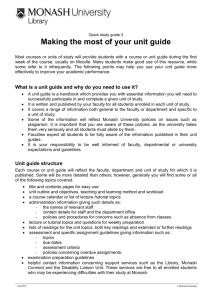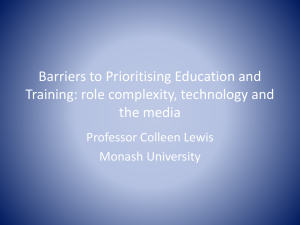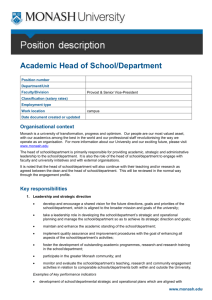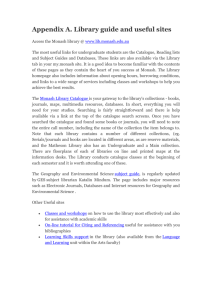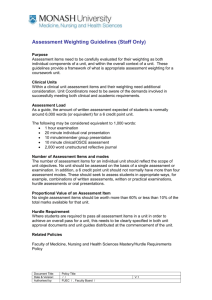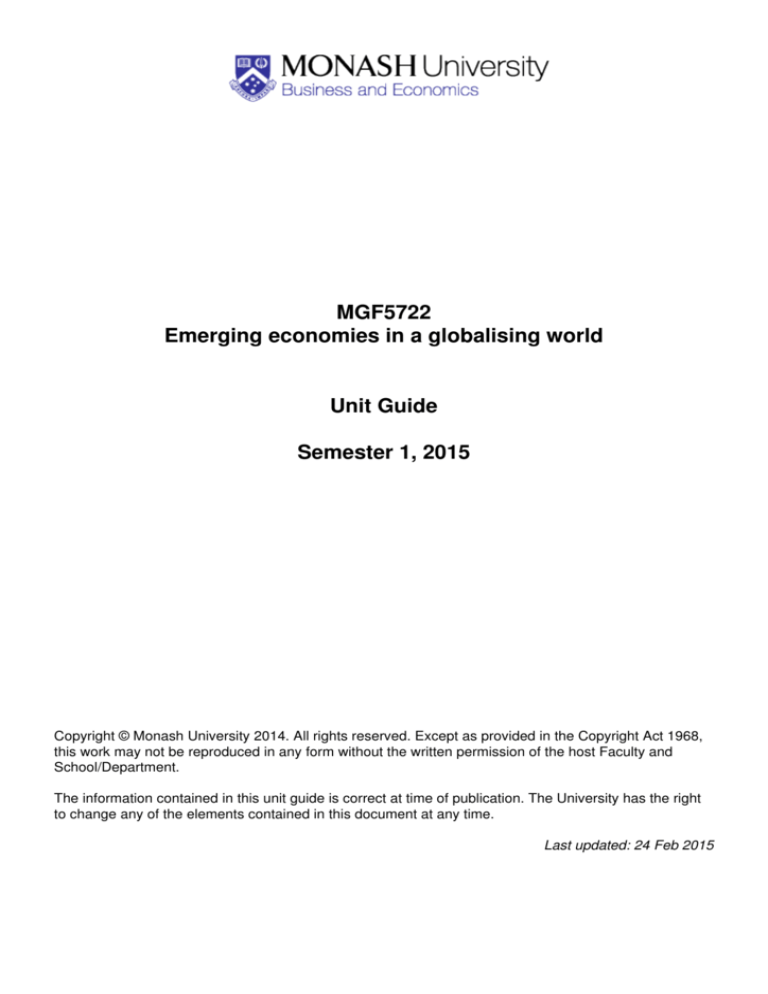
MGF5722
Emerging economies in a globalising world
Unit Guide
Semester 1, 2015
Copyright © Monash University 2014. All rights reserved. Except as provided in the Copyright Act 1968,
this work may not be reproduced in any form without the written permission of the host Faculty and
School/Department.
The information contained in this unit guide is correct at time of publication. The University has the right
to change any of the elements contained in this document at any time.
Last updated: 24 Feb 2015
Table of Contents
MGF5722 Emerging economies in a globalising world - Semester 1, 2015.........................................1
Mode of Delivery..............................................................................................................................1
Workload requirements....................................................................................................................1
Additional workload requirements........................................................................................1
Chief Examiner(s)........................................................................................................................................2
Campus Lecturer(s).....................................................................................................................................2
Caulfield...........................................................................................................................................2
Your feedback to Us....................................................................................................................................2
Previous Student Evaluations of this Unit....................................................................................................2
Academic Overview...................................................................................................................................3
Learning Outcomes.........................................................................................................................3
Unit Schedule.............................................................................................................................................4
Teaching Approach..........................................................................................................................4
Assessment Summary.....................................................................................................................5
Second marking...................................................................................................................5
Return of final marks............................................................................................................5
Assessment criteria..............................................................................................................6
Assessment Requirements......................................................................................................................7
Assessment Tasks...........................................................................................................................7
Assessment task 1...............................................................................................................7
Assessment task 2...............................................................................................................7
Assessment task 3...............................................................................................................7
Assessment task 4...............................................................................................................7
Learning resources......................................................................................................................................8
Feedback to you..........................................................................................................................................8
Assignment submission...............................................................................................................................8
Online submission...........................................................................................................................8
Prescribed text(s) and readings.......................................................................................................8
Other Information......................................................................................................................................9
Policies............................................................................................................................................9
Graduate Attributes Policy...................................................................................................9
Student Charter...........................................................................................................................................9
Student services..........................................................................................................................................9
Monash University Library...........................................................................................................................9
Moodle 2......................................................................................................................................................9
Disability Liaison Unit................................................................................................................................10
MGF5722 Emerging economies in a globalising world - Semester
1, 2015
This unit will provide students with insights into the role of emerging economies in a globalising world.
Using a political economy approach, the unit will provide a comparative perspective on Brazil, Russia,
China, India and South Africa also known as the BRICS. Over the past ten years the geo-political and
economic importance of the BRICS has been increasing. While they have been advocating for a stronger
voice in major international institutions such as the WTO, the World Bank and the IMF, the BRICS do not
have a common identity and their influence and power at the global level is uneven. This unit covers the
history of the BRICS as well as the political, economic, security and foreign policy trends in these
countries. It provides different perspectives on the power of the BRICS in an international context and
focuses on the challenges they face. Particular attention is given to the thematic areas of international
trade, international finance, the environment, global health and food security.
Mode of Delivery
• Caulfield (On-campus block of classes)
• Caulfield (Off-campus)
Workload requirements
Minimum total expected workload to achieve the learning outcomes for this unit is 144 hours per
semester typically comprising a mixture of scheduled learning activities and independent study.
Independent study may include associated readings, assessment and preparation for scheduled
activities. The unit requires on average three/four hours of scheduled activities per week. Scheduled
activities may include a combination of teacher directed learning, peer directed learning and online
engagement.
See also Unit timetable information
Additional workload requirements
This is a six credit point unit and the total time commitment expected of student is 144 hours. Students
should endeavour to spend an average of nine hours in self-directed learning for each topic in addition to
the time spent at the block mode classes. Students enrolled in Coursework programs in the Faculty of
Business and Economics are required to attend a minimum of 80% of the scheduled class sessions for
each unit. If you do not attend the required number of classes, your performance could be compromised,
and you may not be eligible to join a group for the group assessment requirements if you are not present
at class when the groups are assigned.
To be successful, a generally suggested time allocation in self-directed learning for each topic is:
• 3 hours preparation for class (taking notes whilst completing readings, exercises and previewing
lecture notes)
• 3 hours completing assessment tasks (undertaking additional reading and writing assessments)
• 1 hour self-reflection (reviewing notes in preparation for tutorials)
• 1 hour study group (in a group of 4-5 students, reviewing individual notes, preparing for tutorials
and preparing for assessments
If you have not previously invested this amount of time in study, or feel you may need assistance
developing an appropriate time plan for yourself, please register for a time-management workshop with
1
MGF5722 Emerging economies in a globalising world - Semester 1, 2015
Health and Wellbeing or the Library: https://my.monash.edu.au/news-and-events/bookings/
Chief Examiner(s)
Dr Jagjit Plahe
Campus Lecturer(s)
Caulfield
Dr Jagjit Plahe
Campus: Caulfield
Phone: +61 3 990 34700
Email: Jagjit.Plahe@monash.edu
Your feedback to Us
Monash is committed to excellence in education and regularly seeks feedback from students, employers
and staff. One of the key formal ways students have to provide feedback is through the Student
Evaluation of Teaching and Units (SETU) survey. The University’s student evaluation policy requires that
every unit is evaluated each year. Students are strongly encouraged to complete the surveys. The
feedback is anonymous and provides the Faculty with evidence of aspects that students are satisfied
and areas for improvement.
For more information on Monash’s educational strategy, see:
www.monash.edu.au/about/monash-directions/ and on student evaluations, see:
www.policy.monash.edu/policy-bank/academic/education/quality/student-evaluation-policy.html
Previous Student Evaluations of this Unit
If you wish to view how previous students rated this unit, please go to
https://emuapps.monash.edu.au/unitevaluations/index.jsp
2
Academic Overview
Learning Outcomes
The learning goals associated with this unit are to:
1. explain the different theoretical perspectives on the rise of the BRICS
2. explain the history of the BRICS covering domestic and foreign policy perspectives
3. critically evaluate the influence of the BRICS in a globalising world.
3
Unit Schedule
Week
Activities
0
Assessment
Full assessment details will be provided
to students via Moodle
1
Introduction and Theoretical Perspectives (Part 1)
2
Introduction and Theoretical Perspectives (Part 2)
3
China in the Global Economy: Part 1
4
China in the Global Economy: Part 2
5
India in the Global Economy: Part 1
6
India in the Global Economy: Part 2
7
Russia in the Global Economy
8
Brazil in the Global Economy
9
South Africa in the Global Economy
10
Other Emerging Economies in a Globalising World
11
A Changing Global Order? Part 1
12
A Changing Global Order? Part 2
SWOT VAC
No formal assessment is undertaken
SWOT VAC
Examination period
LINK to Assessment Policy:
http://policy.monash.edu.au/policy-bank/
academic/education/assessment/
assessment-in-coursework-policy.html
Teaching Approach
• Lecture and tutorials or problem classes
This unit runs as a 3-hour class. The lectures will be pre-recorded and all students are required to
listen to the lecture prior to the class. Students are also required to prepare for the class as per
weekly instructions which will be up on Moodle. The classes will be highly interactive and will
consist of lively debates and discussions.
• Additionally, in the Department of Management, and in this unit, we adopt a pastoral care
approach to your academic progress and overall wellbeing as a student. University is a time of
change, which induces many responses including anxiety, stress and negative thoughts. This
time is more stressful with other changes within our lives outside of university. If you do need
assistance to manage these changes, or even just talk to someone, there is a lot of support
available, and support that will help. If your first contact cannot assist directly, they will know who
can, so please take the first step and ask.
♦ Please contact your lecturer
♦ Online resources: http://www.monash.edu.au/counselling/self-help/
♦ Please contact counselling: http://www.monash.edu.au/counselling/
♦ Please contact medical services: http://www.monash.edu.au/health-medical/
♦ Please contact Faculty Student Services: http://www.buseco.monash.edu.au/contact.html
♦ Please contact Library and Learning Skills:
http://monash.edu/library/skills/resources/index.html
4
Unit Schedule
There are also other resources freely available, including:
♦ English as a Second Language (ESL) Growth: www.elg.edu.au
◊ If English is not your first language, check out these great exercises and tips to
maintain and enhance your English capacity
♦ Language and Learning Online: www.monash.edu.au/lls/llonline/
◊ Check out these great online learning workshops and tips for academic reading,
writing, listening, speaking, study skills and grammar.
If you are presenting academic at-risk triggers, including missing classes, late submissions, failing
assignments and the like, you may be contacted by your tutor or lecturer enquiring if further
support is needed. Please take advantage of these opportunities. If you are not contacted,
though feel you are at risk, please ask for support.
Again, it is an unfortunate though normal part of university life to be faced with some difficult
situations – there is help to deal with these so please ask for it.
Assessment Summary
Within semester assessment: 100%
Assessment Task
Value
Due Date
Class participation and presentation (on campus
students only)
30%
Ongoing
Individual Essay (on campus students only)
20%
Full details will be provided to students
via Moodle.
Take home exam (all students)
50%
Full details will be provided to students
via Moodle.
Journals (off campus students only)
50%
Full details will be provided to students
via Moodle.
Second marking
Where an assessment task is given a fail grade by an examiner, that piece of work will be marked again
by a second examiner who will independently evaluate the work, and consult with the first marker. No
student will be awarded a fail grade for an assessment task or unit without a second examiner confirming
the result.
Note: Exceptions to this are individual pieces of assessment contributing 10% or less of the final mark,
unless the total of such pieces exceeds 30% of the final mark.
Return of final marks
Faculty policy states that 'the final mark that a student receives for a unit will be determined by the Board
of Examiners on the recommendation of the Chief Examiner taking into account all aspects of
assessment'.
5
Unit Schedule
The final mark for this unit will be released by the Board of Examiners on the date nominated in the
Faculty Calendar. Student results will be accessible through the my.monash portal.
Assessment criteria
Assessment Criteria Grading Descriptors available at:
http://www.buseco.monash.edu.au/esg/agu/policies/assessment.html.
6
Assessment Requirements
Assessment Tasks
•
Assessment task 1
Title:
•
Class participation and presentation (on campus students only)
Due date:
Ongoing
Details of task:
Full details will be provided to students via Moodle.
Weighting/Value:
30%
Estimated return date:
To be advised
Assessment task 2
Title:
•
Individual Essay (on campus students only)
Due date:
Full details will be provided to students via Moodle.
Details of task:
Full details will be provided to students via Moodle.
Weighting/Value:
20%
Estimated return date:
To be advised
Assessment task 3
Title:
•
Take home exam (all students)
Due date:
Full details will be provided to students via Moodle.
Details of task:
Full details will be provided to students via Moodle.
Weighting/Value:
50%
Estimated return date:
To be advised
Assessment task 4
Title:
Journals (off campus students only)
Due date:
Full details will be provided to students via Moodle.
Details of task:
Full details will be provided to students via Moodle.
Weighting/Value:
7
Assessment Requirements
50%
Estimated return date:
To be advised
Learning resources
Monash Library Unit Reading List (if applicable to the unit)
http://readinglists.lib.monash.edu/index.html
Feedback to you
Types of feedback you can expect to receive in this unit are:
• Graded assignments with comments
Assignment submission
Online submission
If Electronic Submission has been approved for your unit, please submit your work via the Moodle site
for this unit, which you can access via links in the my.monash portal.
Prescribed text(s) and readings
To prepare for the lecture you will need to purchase the following textbook online: Nadkarni, V. and
Noonan, N. C. (2013) Emerging Powers in a Comparative Perspective: The Political and Economic Rise
of the BRIC Countries, Bloomsbury.
To prepare for the class discussions a full online reading list is available through the library.
8
Other Information
Policies
Monash has educational policies, procedures and guidelines, which are designed to ensure that staff and
students are aware of the University’s academic standards, and to provide advice on how they might
uphold them. You can find Monash’s Education Policies at:
www.policy.monash.edu.au/policy-bank/academic/education/index.html
Key educational policies include:
• Student Academic Integrity Policy and Student Academic Integrity: Managing Plagiarism and
Collusion Procedures ;
• Assessment in Coursework Programs;
• Special Consideration;
• Grading Scale;
• Discipline: Student Policy;
• Academic Calendar and Semesters;
• Orientation and Transition; and
• Academic and Administrative Complaints and Grievances Policy.
Graduate Attributes Policy
http://www.policy.monash.edu/policy-bank/academic/
education/management/monash-graduate-attributes-policy.html
Student Charter
www.opq.monash.edu.au/ep/student-charter/monash-university-student-charter.html
Student services
The University provides many different kinds of support services for you. Contact your tutor if you need
advice and see the range of services available at http://www.monash.edu.au/students
Monash University Library
The Monash University Library provides a range of services, resources and programs that enable you to
save time and be more effective in your learning and research. Go to www.lib.monash.edu.au or the
library tab in my.monash portal for more information.
Moodle 2
All unit and lecture materials, plus other information of importance to students, are available through the
virtual learning environment Moodle site. You can access Moodle via the my.monash portal.
Where to go for help
If you're stuck, confused or simply not sure how to approach Moodle, there are a number of Moodle
resources that you can tap into.
9
Other Information
Disability Liaison Unit
Students who have a disability or medical condition are welcome to contact the Disability Liaison Unit to
discuss academic support services. Disability Liaison Officers (DLOs) visit all Victorian campuses on a
regular basis.
• Website: http://www.monash.edu/equity-diversity/disability/index.html
• Telephone: 03 9905 5704 to book an appointment with a DLO;
• Email: dlu@monash.edu
• Drop In: Equity and Diversity Centre, Level 1, Building 55, Clayton Campus.
10


